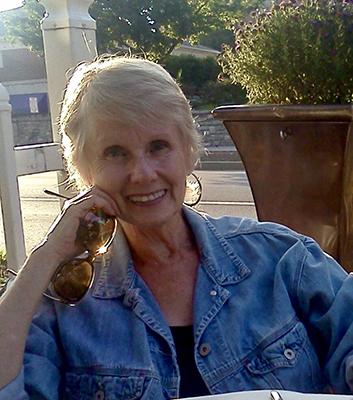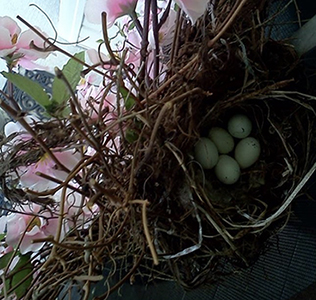
An Interview with Sarah Russell
----------------------------------------------------------------------------------------------------------------
Sarah Russell holds an M.A. in Mass Communication from the University of Denver and a Ph.D. in Communication Theory from the University of Colorado. After a career spent teaching, writing and editing academic prose, she now has more time to devote herself to poetry. Her first poetry collection, ‘I lost summer somewhere’, was published by Kelsay Books in 2019. This was followed by a second collection, ‘Today and Other Seasons’, also published by Kelsay, in 2020. She has awards from Goodreads and Poetry Nook, and is a Pushcart Prize and Best of the Net nominee. She lives with her husband in Denver, Colorado and blogs at SarahRussellPoetry.net.
----------------------------------------------------------------------------------------------------------------
Sarah, tell us when your interest in writing poetry first began and how you managed to keep that flame alive during all those years when you were teaching, writing and editing academic prose.
My father loved poetry, and we read some of the classics every day, scanning for meter, finding meaning and rhyme. I had a thesaurus and rhyming dictionary by age nine and was given the complete works of Edna St. Vincent Millay for my twelfth birthday. She was the muse for my early poems. In the 1970s, I was caught up in the feminist movement, and I found that poetry best expressed my awakening and my anger. But left-brained work caused poetry to take a back seat until I retired and found my bag of metaphors again. I’ve been writing poetry ever since.
The publication of your first collection, ‘I lost summer somewhere’, must have seemed like a turning-point, a pivotal moment, in your writing career. How did you feel when you saw your first collection in print?
I have to say, it’s like seeing your baby after birth. All that work resulting in such triumph and joy. A friend took a picture of me with my new volume in hand, and I’m grinning like the Cheshire Cat!
Your two collections, to me at least, seem very different. They appear to inhabit different worlds. In the first one, there is raw emotion. You do not shy away from tackling difficult issues head-on. In the second, there is a more relaxed acceptance of things, a meditation on life experienced through all the seasons in which you draw metaphors from Nature. To what extent would you agree with this assessment?
I absolutely agree. When I was putting together my first collection, I saw that I had many “nature” poems that didn’t fit the narrative arc I was working on—a woman, nearing the end of her life, reflecting on how she had survived and changed. After the first manuscript was accepted, I started sorting through my poems again, and I saw the narrative arc of a collection that would celebrate the seasons. Nature is healing for me, and I hope that was captured in my second book.
Do poems come easily to you or do you spend a lot of time on revision?
I adhere to Hemingway’s statement that “The first draft of anything is shit.” Of course, some poems come more easily than others (I love it when they seem to write themselves!), but I polish and polish. I usually write a first draft as prose, just putting down what comes without regard for line breaks, etc. Then I go away from it for a day or two. When I pick it back up, I first make a copy of the original and then start whittling on the copy, choosing better words, taking out the fluff. I finally put in line and stanza breaks, and then polish again, seeing it truly as a poem for the first time. Finally I go back to the original to see if I left something out that was important to the poem. I say I start with a totem pole and end up with a toothpick.
You also write short pieces of prose. Is this something we are likely to see more of in the future or do you think that poetry will always be your first love?
Poetry will always be my first love. I had a flash novella called ‘The Ballerina Swan Lake Mobile Homes Country Club Motel’ published last year by Running Wild Press in their Running Wild Novella Anthology series. In that case, the protagonist Wanda took hold of me and wouldn’t let go until I told her story. I keep waiting for another character to take me by the scruff of the neck and demand my time, but it hasn’t happened. And it’s just as well. Poems aren’t nearly as bossy.
Do you have a favourite genre of poetry?
Narrative poetry is my favorite to write and read. I enjoy plain words, artfully written—think Ted Kooser, Mary Oliver, Billy Collins. But when I am feeling an intense emotion, I need the structure of formal poetry, and the villanelle is my favorite go-to. Its repetitions and strict rhyme scheme keep my emotions in check.
Who were you when you were young? Were you shy or extrovert and how has this played into your writing?
I was the only child of older parents, and I spent a great deal of time alone with my imagination. Of course, extroverted adult life took over (it’s hard to be a reclusive soccer mom), but now in retirement I’ve become an introvert again, and it seems to be my natural state. I don’t even turn the car radio on when I drive. I live very much inside my head.
What have you learned about yourself from writing poetry?
That I love words—reading them, writing them, even playing games with them. My husband and I play Scrabble every night, and I love the NYT word puzzles. I’ve also found that I love the organizing poetry requires—both the poems themselves and organizing volumes of poetry. An old editor never dies, I guess. I’ve edited ten volumes of poetry for friends. Eight have been published, and one manuscript is currently being evaluated. The last is still in process. It’s been something I can give back to my poet friends, and I enjoy the collaboration with another poet.
Do you have any pieces of advice to pass on to other aspiring poets?
I have three. 1.) Read, read, read. When I started writing poetry again after being away from it for two or three decades, I saw that the shape of poetry had changed, and I read hundreds of poems to learn how poets were talking about what we’ve always talked about—love, death, injustice, hope. I still read at least 15 poems every day. 2.) Edit mercilessly. Write like a lover, but edit like an assassin. 3.) Find people who will make your poems better. A writing buddy is ideal. I have a friend who reads every poem I write. He always has ideas to make the poem stronger. And find your “tribe”—a group of other poets who have no agenda other than making one another’s work the best it can be. Trust and truth are the key words in finding these people. If people are snide or cutting, walk away. NEVER take their remarks personally. Search for people who love this crazy way of looking at the world as much as you do. They’re out there. The group I found has met every two weeks for eight years. We love and trust each other and support one another through the highs and lows of writing and publishing.
Do you feel positive about the future of poetry?
We’ll always need poetry. I have a friend who sent me a poem about his son. He was flabbergasted. He’s a lawyer who had never written a poem, but what he needed to say could only be said within the confines of a poem. We will always need to face the tough or emotional things in life by coming in at a slant. That’s the gift of poetry. That’s why we scour the internet for poems to read at a funeral, or to give a wedding toast. We trust poets to say what we feel in songs or tributes or grief. I love how poetry has changed through the centuries, and I love young people’s slam poetry, though I can’t do it myself. Poetry will continue to thrive, even with AI rearing its mechanical brain, because good poetry comes from something human and universal and true.
The following poem is reprinted with the author’s permission:
| |

Nesting
The finches are courting
outside our window, a warbled
discussion of real estate and love.
Like last year and the year before,
they want to lease the flower wreath
on our front door. It's always a dilemma:
discourage their rapture or detour
through the garage?
The finches always win. So
for a month we'll wake to overtures
at dawn -- so cheerful, so loud --
show pictures of pin-feathered babies
to friends, recall demand
and pleasures of our own brood,
the bittersweet fledging.
First published in Your Daily Poem
Republished in Centered Magazine |
|
|


